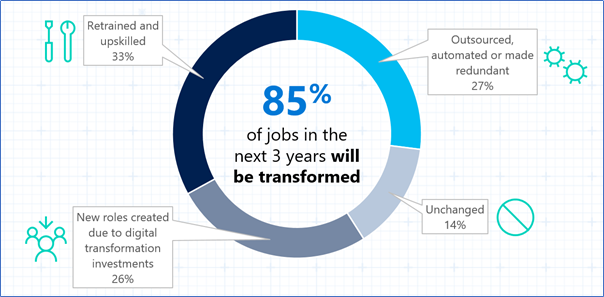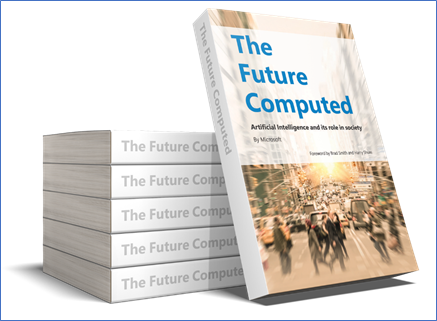By Ralph Haupter, President, Microsoft Asia and Corporate Vice President, Microsoft Corp
There’s no doubt that the advent of broadly-available Artificial Intelligence (AI) offers businesses the prospect of increased productivity and accelerated innovation, whilst also enabling society to help solve some of its toughest – and most persistent – challenges: disease, famine, climate control and natural disasters.
AI is already delivering tangible economic benefits for many organisations across Asia Pacific.
For example, leading global container shipping company OOCL reports that applying AI to their business is already saving them $10m annually, whilst Apollo Hospitals in India are using AI to help predict heart disease amongst its patients.
While we may marvel at what benefits Artificial Intelligence can bring, we are also mindful of AI as a disrupter, especially when it comes to the displacement of jobs. In fact, a key topic of discussion that surfaces when I meet with CEOs and government leaders across Asia Pacific is on the ramifications of AI on the workforce.
Today, as we celebrate international Labor Day, it is also pertinent to examine the far-reaching implication that AI brings to the workforce, and ask ourselves if the social disruptions that AI can potentially create will ultimately overshadow its benefits.
The Evolution of Jobs in the AI-Shaped Future
Let’s first put things in perspective: large-scale disruption is a challenge with every industrial revolution. What 250 years of technological changes have taught us is that technology will have profound implications on the creation, elimination or evolution of jobs. For example, when I first entered the workforce, it was common for offices to have a pool of typists. Clearly, this role is no longer relevant in today’s modern office, thanks to the proliferation of personal computing. The advent of AI will reshape jobs in a similar way.
Microsoft recently partnered with the leading technology advisory firm IDC to assess the digital transformation landscape across the region. Titled “Unlocking the Economic Impact of Digital Transformation in Asia Pacific”, the study surveyed 1,560 business and IT leaders from 15 Asia Pacific economies[i]. It showed that 85% of jobs in Asia Pacific will be transformed in the next three years. (See chart below)
Diving deeper into the results, the respondents said that over 50% of jobs will be redeployed to a new position and/or retrained and upskilled for digital transformation. What’s interesting is that the Study shows that 26% of jobs will be newly created roles from digital transformation, which will offset the 27% of jobs that will he outsourced or automated. In other words, the overall workforce effect will be broadly neutral.
These are clear indications that how businesses organize work, how people find employment and the skills people need to prepare for the workforce are changing dramatically. These changes are likely to accelerate in the decade ahead.
As AI continues to transform the nature of work, we will need to rethink education, skills and training to ensure that people are prepared for the jobs of the future and businesses have access to the talent they need to succeed. And as traditional models of employment transform, we will also need to modernize legal frameworks to recognize new ways of working, provide adequate worker protections and maintain social safety nets.
Building a Better Future Together
For government and business leaders trying to make sense of this AI conundrum, I strongly encourage you to read a book that we recently published, ‘The Future Computed, Artificial Intelligence and its Role in Society’, helmed by Brad Smith, President and Chief Legal Officer; and Harry Shum, Executive Vice President of Microsoft AI and Research Group.
(You can download the book here for free today.)
Future Computed offers three conclusions on AI and the impact on work and jobs:
- First, the organizations and countries that will fare best in the AI race will be early adopters. The reason is straightforward: AI will be useful wherever intelligence is needed and it helps us to be more productive in nearly every field of human endeavor, which can lead to economic growth. Put simply, new jobs and economic progress will favor those that embrace the technology, not those that resist it.
- Second, while we believe that AI will help improve daily life in many ways and help solve big societal problems, we need to be critical when we examine the issues that it can bring. Beyond AI deployment, what’s equally important is to prepare our society and workforce for the impending changes that AI will catalyze by addressing the need for strong ethical principles, the evolution of laws, the importance of training for new skills, and even labor market reforms. These aspects must all come together if we are going to make the most of this new technology.
- Third, to fully realize the benefits of AI, and to minimize the negative outcomes, technology companies, private and public organizations need to come together with a sense of shared responsibility. At Microsoft, we believe in the democratizing of AI. This is similar to our belief that PCs should be accessible for all when Microsoft was founded.
We believe that the AI building blocks that Microsoft is developing today, such as computer vision, speech, and knowledge recognition, should be made available to all so that they can create their own AI-based solutions. AI should not be controlled by just a few organizations. Our AI future should be built by everyone with a vision on how AI can benefit economies and societies as well as how we can tackle AI issues and their implications.
The future of AI can burn brightly or dimly. My viewpoint is that disruption is a norm, and ability to adapt to disruptions is what defines all of us. And to adapt to the fast-approaching, rapidly evolving AI future, all parties – from workers to enterprises to governments – will need to spend more time listening to each other, collaborate and constantly learn new knowledge and skills.



